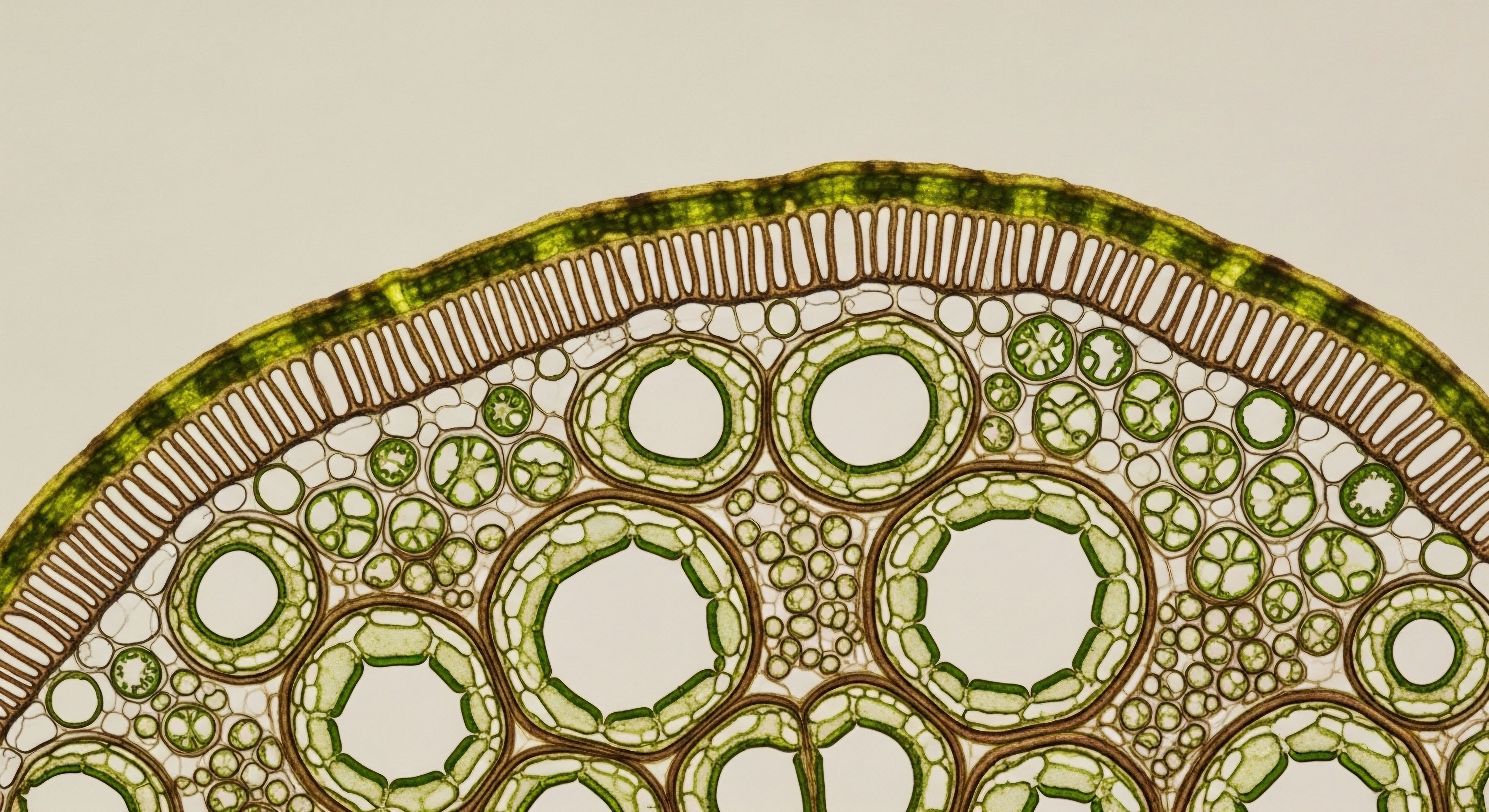

The Stress State Recalibration
Modern existence imposes relentless demands upon our internal systems. Persistent demands on our attention and energy can subtly erode our biological resilience, often manifesting as creeping fatigue, a dulling of mental acuity, or a subtle resistance to body composition improvements.
These signals indicate an overtaxed autonomic nervous system, a system designed for acute bursts of survival, ill-suited for the chronic, low-grade pressures of daily life. Confronting this challenge requires a strategic intervention, a means to command the body’s intrinsic adaptive mechanisms.
Consider the subtle, yet pervasive, influence of chronic stress upon your endocrine system. Elevated cortisol, a primary stress hormone, can disrupt the delicate balance of other vital messengers, including testosterone and growth hormone. This hormonal disharmony diminishes metabolic efficiency, impacts recovery capacity, and dulls the vibrant energy that defines peak performance. A proactive stance dictates a method to systematically fortify this vital system, moving beyond mere management of symptoms to a comprehensive overhaul of your internal operating state.
The pursuit of optimal vitality extends beyond conventional approaches; it involves discovering precise levers for biological recalibration. Reclaiming your edge, sharpening your focus, and sculpting a resilient physique demand more than just effort. It requires intelligence and the courage to engage protocols that directly reprogram your foundational stress response. Deliberate cold exposure emerges as a powerful, ancient, and scientifically robust method for this exact purpose. It compels a physiological reset, directly addressing the core imbalances many experience.
Modern life often brings a persistent, low-grade stress, quietly eroding biological resilience and dimming peak vitality.
A systematic re-engagement with hormetic stressors, such as precise cold exposure, prepares your biology for greater adaptability. This practice enhances resilience, transforming the body’s reaction to future challenges. Rather than succumbing to environmental pressures, you engineer an internal environment poised for robust performance. This method cultivates a profound mastery over your physiological responses, making you the orchestrator of your biological destiny.


Internal Engineering through Elemental Shock
The mechanism by which deliberate cold exposure transforms your stress response centers on a principle of controlled physiological shock. When immersed in cold water, your body experiences an acute stressor. This controlled stress triggers a cascade of adaptive responses, a powerful recalibration of your autonomic nervous system.
Your system learns to rapidly shift from a heightened fight-or-flight state to a calm, recuperative parasympathetic dominance, fostering resilience against future stressors. This acute, intense stimulus serves as a training ground for your nervous system, building a superior capacity for regulation.
Cold immersion rapidly activates the sympathetic nervous system, leading to a surge of norepinephrine. This neurotransmitter, a cousin to adrenaline, plays a critical role in attention, focus, and mood regulation. Consistent exposure to cold can lead to an increase in baseline norepinephrine levels, translating into sustained improvements in mental clarity and emotional stability throughout your daily life. It provides a natural, clean energy boost, sharpening cognitive functions without the artificial peaks and crashes associated with stimulants.
Moreover, cold exposure stimulates the production of cold shock proteins and initiates the activation of brown adipose tissue (BAT). Cold shock proteins assist in cellular repair and reduce oxidative stress, contributing to overall cellular longevity. Brown fat, unlike white fat, generates heat through non-shivering thermogenesis, a metabolic process that burns calories. Regular cold exposure increases BAT activity and density, offering a direct pathway to enhanced metabolic flexibility and improved body composition.
The vagal nerve, a crucial component of the parasympathetic nervous system, also benefits significantly from cold stimulation. The vagal nerve influences heart rate variability (HRV), a key biomarker of nervous system health and stress resilience. Boosting vagal tone through cold exposure means a quicker recovery from stress, improved digestive function, and enhanced mood regulation. This profound impact on vagal function directly optimizes your body’s relaxation and recovery capabilities.
Integrating deliberate cold exposure requires a structured approach. Progression is key, starting with shorter durations and gradually increasing time and reducing temperature. Cold showers serve as an accessible entry point, allowing your body to adapt before moving to full immersion.
A structured cold exposure protocol might look like this:
- Initiate with Cold Showers ∞ Begin with a warm shower, then switch to cold for 30-60 seconds. Concentrate on deep, controlled breathing. Your body will adapt to the initial shock.
- Extend Duration and Lower Temperature ∞ As comfort increases, extend cold exposure to 2-3 minutes. Gradually reduce water temperature over several sessions.
- Progress to Cold Baths/Ice Baths ∞ For deeper physiological impact, consider ice baths. Start with water around 50-60°F (10-15°C) for 2-5 minutes. Slowly decrease the temperature to 40-45°F (4-7°C) for up to 10-15 minutes, based on individual tolerance and goals.
- Focus on Breathwork ∞ Controlled, deep diaphragmatic breathing significantly aids in managing the initial cold shock response. This practice amplifies the vagal nerve stimulation and promotes a calm state.
- Consistent Cadence ∞ Aim for 3-5 sessions per week to consistently train your system and realize the cumulative benefits. Regularity amplifies the adaptive responses.
Deliberate cold immersion serves as a precise physiological trigger, reprogramming the autonomic nervous system for superior stress resilience and cognitive clarity.
This systematic engagement with cold offers a direct pathway to enhanced physiological control. It primes your system, building a reservoir of internal strength. Understanding these mechanisms transforms cold exposure from a simple act into a powerful biological strategy.


Unlocking Your Performance Horizon
The optimal timing for integrating deliberate cold exposure aligns with your personal performance objectives and daily rhythms. Many find mornings most impactful, as the norepinephrine surge from cold immersion delivers a sharp, sustained mental lift. This morning ritual can replace reliance on caffeine, providing a cleaner, more stable energy profile for hours. It sets a robust foundation for focused work or intense physical training, sharpening your cognitive and physical readiness.
Consider cold exposure immediately following an intense workout. This practice accelerates recovery by reducing exercise-induced inflammation and promoting cellular repair mechanisms. It helps mitigate muscle soreness, allowing for faster return to peak training capacity. Athletes and high-performers frequently employ this strategy to optimize their recovery windows.
You will begin to perceive shifts within weeks of consistent practice. Initial adaptations include improved cold tolerance and a noticeable reduction in the “cold shock” response. Beyond these immediate sensations, individuals report enhanced mental clarity, a greater capacity to manage daily stressors, and improved sleep quality. The internal resilience you cultivate translates into tangible improvements in your everyday experience.
This powerful protocol becomes relevant when you seek to move beyond passive acceptance of physiological decline. It is an intelligent choice for individuals feeling a drag on their energy, experiencing persistent mental fogginess, or observing a plateau in their physical performance. Deliberate cold exposure provides a direct biological intervention, empowering you to reclaim lost vitality. It enables a proactive redefinition of your health trajectory, moving towards a state of sustained high performance.
The cumulative effects extend far beyond the immediate post-cold sensation. Over months, you cultivate a profoundly resilient nervous system, a more metabolically efficient body, and an enhanced capacity for sustained focus. This systematic investment yields dividends in every aspect of your life, from professional output to personal well-being. The transformation becomes an undeniable reality, a testament to your commitment to biological mastery.

Mastering Your Internal Blueprint
The journey toward peak human performance and enduring vitality involves a relentless pursuit of intelligent interventions. Deliberate cold exposure stands as a powerful testament to the body’s incredible adaptive capacity, offering a direct path to re-engineering your stress response. This is not merely about enduring the cold; it signifies an intentional recalibration of your deepest physiological settings.
You command your biology, transforming potential performance blockers into opportunities for profound growth. Each controlled immersion into the elements strengthens your resolve, recalibrating your internal compass.
The capacity for true well-being resides in your ability to shape your internal environment, rather than passively react to external conditions. This proactive approach to biological optimization offers an exciting frontier for personal development. As the visionary architect Buckminster Fuller once asserted, “You never change things by fighting the existing reality.
To change something, build a new model that makes the existing model obsolete.” Deliberate cold exposure embodies this principle, building a new physiological model that renders an overtaxed stress response a relic of the past.



